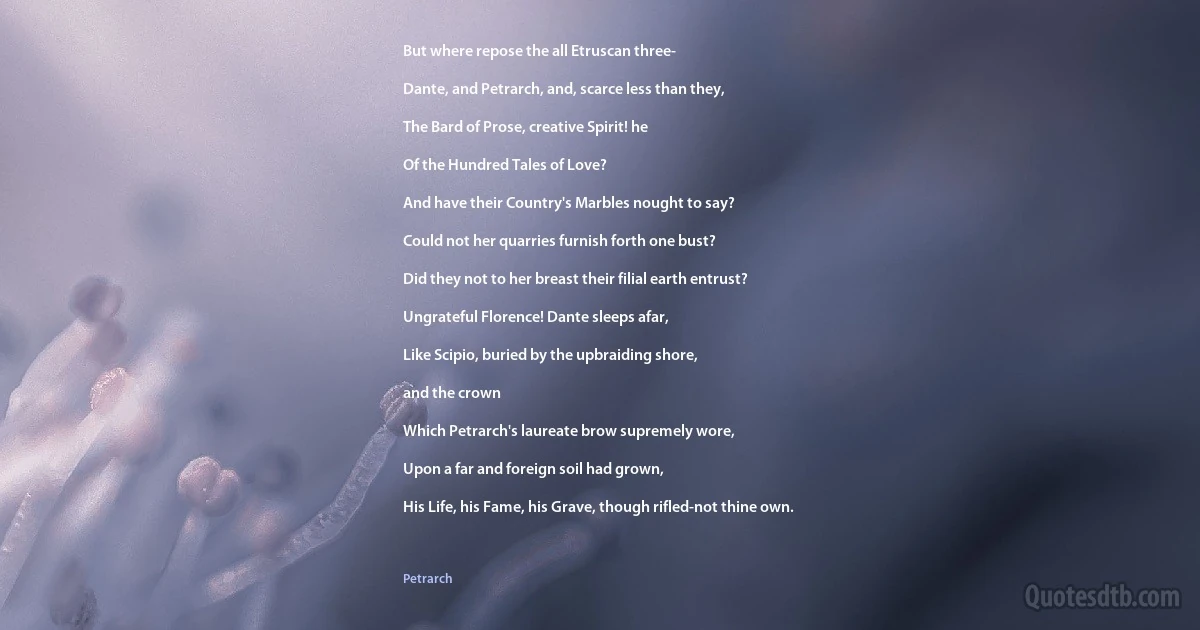Florence Quotes - page 2
And the voices in the waves are always whispering to Florence, in their ceaseless murmuring, of love - of love, eternal and illimitable, not bounded by the confines of this world, or by the end of time, but ranging still, beyond the sea, beyond the sky, to the invisible country far away.

Charles Dickens
This is the fairest picture on our planet, the most enchanting to look upon, the most satisfying to the eye and spirit. To see the sun sink down, drowned in his pink and purple and golden floods, and overwhelm Florence with tides of color that make all the sharp lines dim and faint and turn the solid city to a city of dreams, is a sight to stir the coldest nature, and make a sympathetic one drunk with ecstasy.

Mark Twain
From the multitude of books published on the subject of cultivating the earth, one would have imagined the art to have been more studied, than it really has been; since upon the whole it continued in. a sort of declining condition from the days of Virgil and Columella, till the time of Constantine IV. and then lay in a kind of dormant state till about the middle of Henry VIIIth's reign, when it was rather revived,, than improved.
Indeed, about that time, Judge Fitzherbert, in England (better known among us, as author of another/ excellent work, called Natura Brevium) Tatti, Stefano, Agostino Gallo, Sansovino, Lauro, Tarello, &c. in Italy, published several considerable books in Agriculture; but our countryman was the first, if we except Crescenzio dell' Agricoltura, (whose fine performance was printed at Florence in 1478) and Pier Marino the translator of Palladius de Re Rustica, who made his work public in the year 1528.

Walter Harte
During her senior year Frances... heard Florence Kelley speak. ...[K]nown as a "raging furnace" about issues of social justice, Kelley had successfully fought to get [Illinois] laws passed... to prohibit child labor and to limit the number of hours that women worked. According to Perkins, Kelley's speech "first opened my mind to... the work which became my vocation."

Frances Perkins
The rich world likes and wishes to believe that someone, somewhere, is doing something for the Third World. For this reason, it does not inquire too closely into the motives or practices of anyone who fulfills, however vicariously, this mandate. The great white hope meets the great black hole; the mission to the heathen blends with the comforting myth of Florence Nightingale. As ever, the true address of the missionary is to the self-satisfaction of the sponsor and the donor, and not to the needs of the downtrodden. Helpless infants, abandoned derelicts, lepers and the terminally ill are the raw material for demonstrations of compassion. They are in no position to complain, and their passivity and abjection is considered a sterling trait. It is time to recognize that the world's leading exponent of this false consolation is herself a demagogue, an obscurantist and a servant of earthly powers.

Christopher Hitchens
Dante has not deigned to take his inspiration from any other. He has wished to be himself, himself alone; in a word, to create. He has occupied a vast space, and has filled it with the superiority of a sublime mind. He is diverse, strong, and gracious. He has imagination, warmth, and enthusiasm. He makes his reader tremble, shed tears, feel the thrill of honor in a way that is the height of art. Severe and menacing, he has terrible imprecations for crime, scourgings for vice, sorrow for misfortune. As a citizen, affected by the laws of the republic, he thunders against its oppressors, but he is always ready to excuse his native city, Florence is ever to him his sweet, beloved country, dear to his heart. I am envious for my dear France, that she has never produced a rival to Dante; that this Colossus has not had his equal among us. No, there is no reputation which can be compared to his.

Napoleon Bonaparte
As modern interpolators... say, the bubonic plague winnowed down Europe's population to a scale more congenial with its resource base. After that big first wave of the disease, [the] land was cheaper and human labor better rewarded. Eventually, more food got around. Incidentally, the plague provoked nostalgia for the classical antiquity of Greece and Rome, especially among the scholars of Florence, launching the extravaganzas of the Renaissance [which led to the Age of Exploration and the Scientific Revolution], the Enlightenment [which led to the Industrial Revolution which, in turn, led] [...] eventually [to] our own pageant of techno-supremacist Modernity [which led to the problems we face today].

James Howard Kunstler


